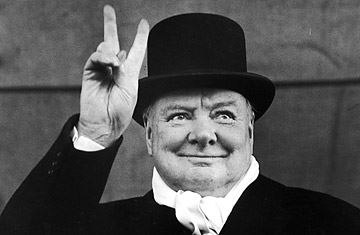 |
| (http://content.time.com/time/specials/packages/art ()) |
Only true heroes use their lives to protect people they do not know. One of these true heroes is Winston Churchill, an English gentleman and savior of England--and the world. Churchill was a rebellious child who was a struggling student. His father eventually sent him away to a military school, where Churchill learned about and fulfilled his love for military strategies ("Winston Churchill Biography"). He signed up to go to war and fight for the country he loved, and was disappointed to see how little help he was. He came back to England to run for high military positions, and eventually became Prime Minister, twice! ("Young Churchill: Adventure with Purpose.") In his time as Prime Minister, Churchill predicted WWII and was one of the strongest and smartest forces on the Allies' side. With others' assistance, Churchill helped keep the peace by calming and comforting the scared people in England, preparing his country for the fight of its life, and eventually, helping change the tide of the war, bringing a win for freedom ("Winston Churchill."). Winston Churchill demonstrates the traits that any true hero should strive to imitate, by having inspired and saved millions with his loyalty, intelligence, and bulldogged determination.
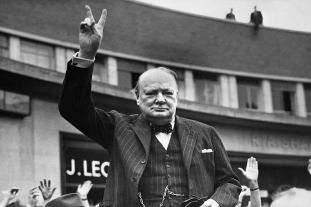 |
| (http://blog.hmns.org/tag/winston-churchill-quotes/ ()) |
Churchill showed his extreme loyalty to his beloved country and its people. During both times of crisis and peace, he was always there to help, whether noticed or not. Throughout war, Churchill knew that he had to go out to bombed areas of the city he so dearly loved and console its inhabitants: Donning a special "siren suit" of his own design, Churchill regularly ventured out into the streets of London after (and sometimes during) air raids to tour bomb sites and offer moral support to the local residents. They, in turn, welcomed the man they affectionately called with warmth and cheers, marveling at his gallantry, unflagging optimism, and total lack of fear. Thus did Churchill successfully rally his citizens to the cause and instill them with confidence during an extremely difficult period, which he described as "their finest hour" ("Winston Churchill"). Churchill kept his head up through tough times, and worried less about himself than his nation. He went out to comfort others and attempt to ease their pain and suffering. He inspired them to keep their chins up through the war, and hoped they'd never give up being optimistic. Churchill encouraged people to stay confident and calm in times of panic, which led to England being as tranquil as could be in such a chaotic situation. The residents of his country were grateful, and could tell how much he cared about their land, and his loyalty shined through in times of pandemonium. Later down the road, after Churchill had already sacrificed countless years of his life for England, he was asked again to take over: "By 1951, Britians had grown tired of the Labour party, which had been unable to deliver on most of its promises of a brighter future. Voters again turned to the Conservatives, and at the age of seventy-seven, Churchill assumed the post of prime minister for the second time, serving until he voluntarily resigned in 1955" ("Winston Churchill"). Churchill was ready to sacrifice his precious later years trying to make the world better for those around him. Showing his loyalty through his work ethic, he entered office again understanding that there was no slack of work until he felt truly done, choosing to quit himself. Churchill ended his career with an image of being strong, dedicated, and faithful to his beautiful country that he loved so much, earning every bit of praise heaped on him.
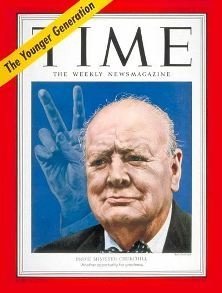 |
| (http://content.time.com/time/covers/0,16641,195111 ()) |
Churchill saved many lives, countries, and, overall, the wonderful world we have today, from destruction with his exceptional amount of intelligence. Surrounded by some of the smartest of his time, Churchill was one of the brightest and most attentive men of all, shown by how he followed the facts, no matter how it made him look: Churchill was one of the few government leaders to recognize that Germany was preparing for war and that Great Britain should do the same. Although his warnings fell largely on deaf ears, he boldly went about the business of modernizing the Royal Navy and making suggestions for improving other branches of the service, even pushing for the development of a strange armored vehicle that was dubbed "Winston's Folly"--better known later as a tank ("Winston Churchill"). Churchill stayed true to himself and spoke his mind to any that would listen. Many did not, however, he regardlessly stuck with his opinion that Germany was going to start another war and began to prepare for the possibility of it. Because of him, England was as prepared as they could be for such a massive and horrific bloodshed that was about to befall the world. Realizing that he had to prepare for the inevitable war upon them, Churchill set to work: "On August 4, 1914, thanks to Churchill's foresight and perseverance, England entered World War I with the best navy in the world. The first lord of the admiralty [Churchill] remained intensely involved in military matters, even working out strategies with the help of various technical advisors" ("Winston Churchill"). Churchill was so smart, he predicted WWII before most people, and he actually did something about it. He made sure to spread the world and build and grow Britain's war abilities until they were the best they could be at that time. Churchill helped save an incalculable number of lives, because without his intelligent forewarning and military help, the Nazis very well could have won. Churchill's intellect and wisdom helped engineer the path to success through one of the most hard-fought and vicious wars ever. His intelligence was one of the key factors in being able to combat some of the most destructive war machines the world has ever seen.
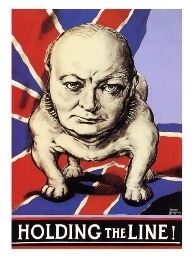 |
| (http://www.planetfigure.com/threads/britisch-bulld ()) |
Through his determination, Churchill proceeded to stick with his own brilliant ideas, instead of succumbing to peer pressure. By having the resolve to listen to and believe in himself, Churchill was able to save countless lives. Churchill was insistent on his ideas and adhered to his commitments. When losing an election early in his political career, he stayed persistent until he came out with what he wanted: "In 1922, Churchill lost his seat in the House of Commons...He ran again several times before he was finally victorious in late 1924.. During the two years he was out of office, however, Churchill was far from inactive. He wrote The World Crisis, a six-volume history of World War I, which was very well received" ("Winston Churchill"). After losing the election, Churchill stayed determined and ran again many times until he reached his goal of getting back his seat. Although he could have felt crushed that he was voted out, he instead kept busy documenting World War I to help people in the future to understand the (and prevent another) tragedy. Even at an old age, Churchill stayed determined enough to keep up his journey of making the world a better place: King George VI asked Churchill to form a new government. Thus, at the age of sixty-five--an age when most people are looking forward to retirement--the somber yet determined statesman embarked on what would prove to be the most challenging journey in his life and in the history of his nation. "I have nothing to offer but blood, toil, tears, and sweat," he remarked upon taking office. "Let us go forward together with our united strength" ("Winston Churchill"). Churchill was relentless and remained steadfast to his resolve to help his country in any way he could, and was determined enough to embark on a grueling journey to make a difference. Even through his old years, Churchill decided and knew in his heart that his life was made to help those around them, not himself. Churchill had a captivating voice, and used his charisma to help rather than hurt. During his time, he said: "In the height of the second great war, it is a great pleasure to come to Leeds and bring to the citizens a word of thanks and encouragement in all the work they are doing to promote the common cause of many nations and in many lands. That cause appeals to the hearts of all those in the human race who are not already gripped by tyranny or who have not already been seduced to its insidious voice. That cause is shared by all the millions of our cousins across the Atlantic who are preparing night and day to have their will and rights respected. It appeals to the patient millions of China...It appeals to the noble manhood of Russia, now at full grips with the murderous enemy, striking blow for blow"(Lyons, Justin D. ). Churchill uses his speech to empower others, instead of disempowering. He chose his words carefully and used them to build the good people up, letting them know that he was there for them and gave cheers to them to keep themselves passionate. Churchill stuck to his mind and kept a level head. When it came to a decision, he was honest about his beliefs and did not allow others to influence him. His determination kept the world sane when everything around them was nonsense. He helped keep heads clear and minds pure, and only pure determination could keep him from giving up.
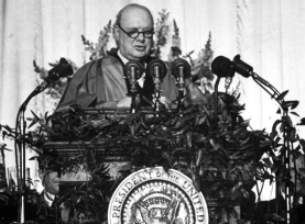 |
| (http://time.com/3720723/iron-curtain-speech/ ()) |
With his intelligence, determination, and loyalty, Churchill is an inspiration to all that look at his life's work, and is, in every respect, a true hero. Churchill used his words to inspire and help make a difference in a positive way. Each of his actions were used to encourage, comfort, and save people from the injustice so often among them. He uses his words to motivate others, uplifting them by reminding them to live in the present, because there is no end point of success or of failure. To win the game of life, one just needs the courage to survive and keep one's hopes up for a better future that only they can help build. He does not get down on himself if others do not value his opinion, Churchill instead stayed strong and kept in mind that any idea is up for interpretation and can be criticized. It is better to have someone disagreeing with your belief than not having one at all. A true hero dedicates time to help others, while Churchill dedicated his entire life to save and protect the world. Overall, Churchill chose to inspire others with his words and ideas, encouraging his peers to keep their chins up and their heads high and strong. Everyone can and should learn from his advice, encouragement, and overarching success on his life, and must always remember: ""Never give in! Never give in! Never, never, never, never, never--in nothing great or small, large or petty--never give in except to convictions of honor and good sense"("Winston Churchill"). Works Cited Lyons, Justin D. "Young Churchill: Adventure with Purpose." Student Research Center. EBSCOhost, 1 May 2015. Web. 30 Apr. 2015. "Winston Churchill Biography." Bio.com. A&E Networks Television, 1 Jan. 2015. Web. 3 May 2015. "Winston Churchill." Contemporary Heroes and Heroines. Vol. 2. Detroit: Gale, 1992. Biography in Context. Web. 30 Apr. 2015.
Page created on 5/19/2015 12:00:00 AM
Last edited 5/19/2015 12:00:00 AM
